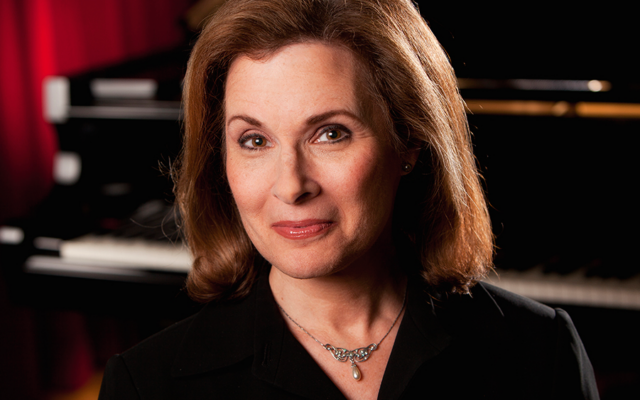For 44 Years, Reitzes Has Been the Voice of WABE
Lois Reitzes, who first was hired at WABE in 1979, is believed to have had the longest career at one station in Atlanta history.
In 1979, when Lois Reitzes first came to WABE, the National Public Radio station in Atlanta, most of the programming during the day was broadcast for Atlanta’s public schools.
The station, which was owned by the Atlanta school board, was less interested in what its adult listeners wanted to hear than in how the station could be used to provide supplementary instruction for children in such subjects as mathematics or reading.
Reitzes would wake up early and sign the station on in the morning for NPR’s “Morning Edition,” a national news program, which had just debuted.
“I would arrive at 5:30 a.m. and get us on the air. ‘Morning Edition’ was on from 7 a.m. until 9 a.m. In those early days at 9 a.m., we would monitor the instructional programs that were going out of the air, and that’s when I would go to work on music programing.”

In the afternoon, at 3 p.m., there would be a couple of hours of classical music, then the station broadcast another hour and a half of news from NPR, and it was back to more classical music until midnight, when the station went off the air.
The programming schedule, in those first years was simple, predictable, and not very challenging, but that began to change in 1982 when the educational programming was moved to a sub-carrier on the FM dial that freed up the station for programming throughout the day.
That’s when Reitzes’ trips to the station’s record library, with its large files of long-playing recordings, became more important. Before moving to Atlanta in 1978, she did graduate study in music history at Indiana University. Her only radio experience was a short stint at the university’s radio station, but she knew music.
Newly married to a husband who had just received a PhD in sociology and was starting a career at Georgia State University, she put her degree to good use at the station.
Starting in 1982, she did the intermission programs during the broadcasts of the Atlanta Symphony Orchestra from the Woodruff Arts Center. Ten years later, she began hosting the regular broadcast herself. She is still doing it, 44 years after sitting down for the first time in front of a WABE microphone. Today, she’s director of arts and cultural programming at the station and has been on the air longer than anyone in the city.
Over the years, her distinctive voice and her broad knowledge of the classic repertoire endeared her to a loyal audience of music fans. They followed her to Europe for trips the station offered each year to music venues on the continent. Occasionally, in the days when you could call directly into the studio, she got to know them personally while the music was playing.

“I had people calling, asking for me to give them suggestions for music to listen to in labor and delivery. I programmed wedding music. All of this, of course, not as a consultant or paid, but as a favor. And this was somewhat shocking for me. I have people come to ask me for music suggestions for their own funerals.”
Occasionally, she would get calls from Carroll O’Connor, the noted television star who was an avid classical music buff. He lived in the city for nine months each year in the 1990s, when doing his hit television series, “In The Heat of The Night.”
“Eventually, we became telephone pals and we met eventually in person,” Reitzes recalls. “My husband was part of a civic organization called Resurgence. It was, I believe, among the first multi-racial civic organizations in the city. Because his series, ‘In The Heat Of The Night,’ had a strong racial storyline, I asked Carroll if he would be willing to speak to the group, and to my astonishment, he did.”
Today, aside from the symphony broadcasts, classical music is mostly just a memory on the station. But Reitzes’ daily hour-long program, “City Lights,” about the arts in Atlanta, is a popular feature on WABE and is available as a podcast.
She and her husband, Don, who is a retired dean at GSU, have been active members of the community. She is a frequent host at the opening or closing nights of the Atlanta Jewish Film Festival and, for almost 40 years, they have been active members of The Temple.
“Rabbi Peter Berg and the rest of The Temple clergy do such a gorgeous job of carrying on the traditions, carrying on the best of Jewish values. It’s a privilege to be able to share this pride that I have in our heritage, both in my broadcasts and within the community.”




comments